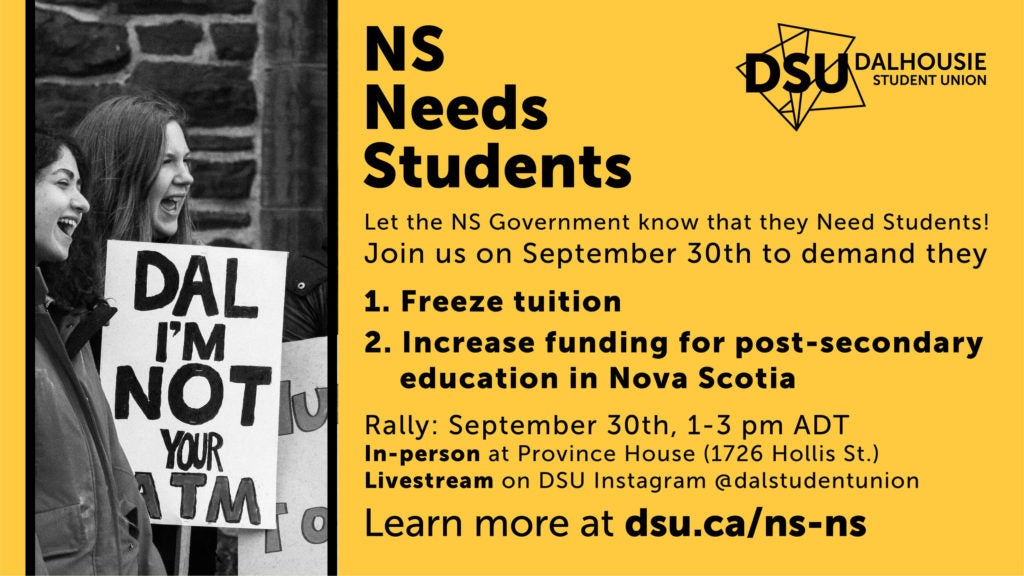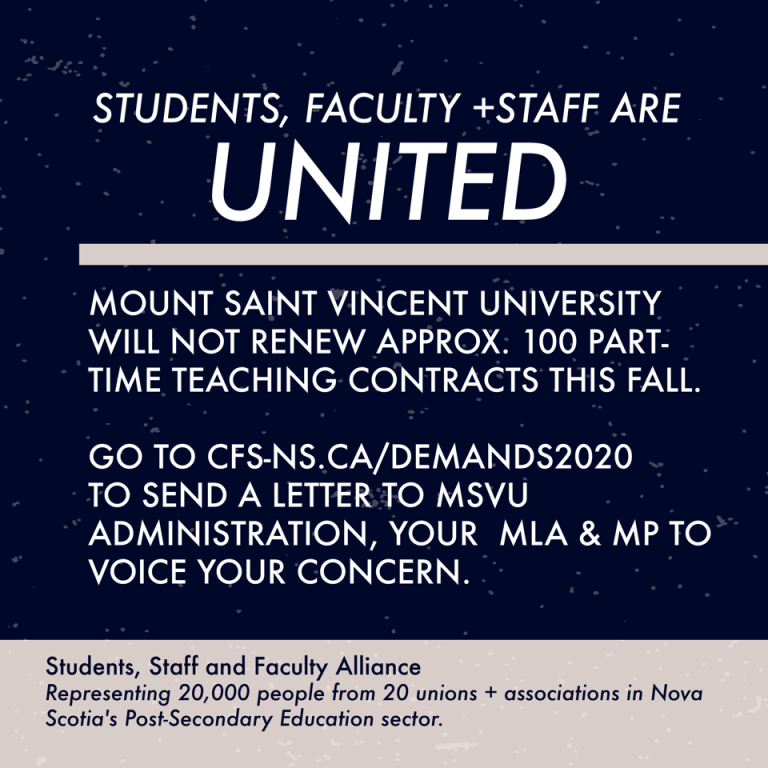To CUPE 3912 members at Dalhousie: We stand in solidarity with our colleagues in the Dalhousie Faculty Association. Please see the latest email update for a message about the impact of a possible DFA strike on TAs and part-time instructors. Also note Karen Harper, our president, will email further information after meeting with Dalhousie administration next week.
Uncategorized
Fair Employment Week – October 19-23
CAUT’s Fair Employment Week is from October 19-23. Fair Employment Week is an annual campaign to raise awareness about precarious employment on university campuses, and the issues that contract academic staff face. There are a series of online events planned. You can check out the schedule here: http://makeitfair.caut.ca
We will be sharing updates and information on our social media throughout the week.
Rally for NS Needs Students – CANCELLED
Hello Nova Scotia students! both in person or online.
We have all made the transition to online education but at what cost?Students – you are paying more (3% more this year) even though you are getting less while not being able to participate in-person in classes, at libraries and in other on-campus activities. Many of you have not been able to get summer jobs, which adds to the cost of this pandemic for you.
Faculty continue to put in their best efforts, often juggling kids at home at the same time. But teaching remotely is a steep uphill learning curve that takes more time, particularly with large class sizes.
Students and faculty understand that there is a cost for everyone during this pandemic. That is why the government introduced the CERB and other benefits. But where is the emergency benefit for students? for faculty? for post-secondary education?
The federal government has not provided emergency funding for universities. This impacts all of us. Students are suffering and so are precarious employees, many of whom are your instructors.
Without government funding, university administrators have been hiring fewer instructors. This impacts you. You now have fewer course options as courses have been cancelled or you find yourselves in larger classes as course sections have been merged. Teaching more students online in fewer courses results in layoffs of part-time instructors and impacts your education. Larger class sizes also increases the workload and stress for remaining instructors, which impacts your learning even more.
The pandemic has brought into focus the precarity and vulnerability of many aspects of our society including post-secondary education. Student tuition keeps rising every year at a rate that is much greater than the increase in salary for part-time instructors. Where is the money going? Certainly not to many of your instructors. At some universities in Nova Scotia, about a third of your courses are taught by part-time instructors who have to apply to teach every course, are paid the worst stipends in Atlantic Canada and among the worst in the country, and have virtually no benefits. They are excellent professors, but the precarious and vulnerable nature of their employment impacts YOUR education.
We need to freeze or lower student tuition so that ALL members of our society can attend university. We need to substantially increase government funding so that post-secondary education does not have to rely on tuition from international students and can afford to provide all employees with a decent wage and benefits. Our working conditions are your learning conditions. Post-secondary education should be affordable for all faculty and all students!
Treaty Day and Mi’kmaq History Month
October 1 is Treaty Day in Mi’kma’ki. Since 1986, on this day, all citizens of Nova Scotia are invited to remember and reaffirm the treaties signed between Mi’kmaq People and the British Crown. The purpose of Treaty Day is to promote the public awareness of Mi’kmaq history and culture for all Nova Scotians, and to recognize the continued importance of these treaties. As such, since 1993, October is recognized as Mi’kmaq History Month. This is a month to recognize and celebrate Mi’kmaq culture, and to educate ourselves on Mi’kmaq history. Across the provinces there are events that showcase this history.
For Treaty Day, we acknowledge that our members work in institutions that are in Mi’kma’ki, the ancestral and unceded territory of the Mi’kmaq People. This territory is covered by the Treaties of Peace and Friendship, which Mi’kmaq, Wolastoqiyik, and Passamaquoddy Peoples first signed with the British Crown in 1726, and were reaffirmed in subsequent treaties. These treaties did not deal with the surrender of land and resources, but in fact recognized Mi’kmaq and Wolastoqiyik title, and established rules for what was to be an ongoing relationship between nations.
You can read these treaties here:
https://archives.novascotia.ca/mikmaq/results/?Search=AR5&SearchList1=all&TABLE2=on
The ongoing validity of these treaties means that we are all Treaty people. As educators, CUPE 3912 members have particular opportunities to include treaty recognition and education, and Mi’kmaq culture and knowledge in our work. There is a growing list of resources on diversifying our classroom practices on our website, and look for upcoming workshops on diversity and inclusion. Take some time to learn about treaties, decolonization, and Mi’kmaq culture and heritage this month, and to reflect on how this can be incorporated into our teaching.
For more information on Mi’kmaq History Month: https://mikmaqhistorymonth.ca
To learn more about Treaty Day visit: https://www.unsm.org/treaty-day
NS Needs Students Rally, Postponed until October 14
It will also be livestreamed on DSU Instagram @dalstudentunion
Online Orientation and Welcome
In anticipation of the start of fall term, we have put our CUPE 101 introductory slide show, and our introductory brochure online.
They are also attached below (click the download links below, or try reloading the page if they aren’t visible).
If you need any more information please contact your VP, or our Outreach Coordinator.
[gview file=”http://cupe3912.ca/wp-content/uploads/sites/146/2020/08/CUPE-101.pdf”]
[gview file=”http://cupe3912.ca/wp-content/uploads/sites/146/2020/08/CUPE-3912-Brochure.pdf”]
Happy Halifax Pride, July 16-26
Today marks the start of the Halifax Pride Festival, a time to celebrate 2SLGBTQIA+ communities, and to reflect on the ongoing struggle for equality and justice that members of these communities have and continue to face.
As workers in post-secondary institutions, we are in positions to work towards equality and inclusion in our workplaces, and to implement lessons from 2SLGBTQIA+ activists and organizers into our pedagogical approaches and practices. Last fall, with South House, gender and sexual resource centre, CUPE 3912 organized a workshop on 2SLGBTQIA+ inclusion in the classroom, and how to incorporate tangible allyship in our work. But there is always more to learn! Resources are available at SMU, MSVU, and Dalhousie.
While celebrating Pride, we should also take time to learn about the origins of Pride in Halifax and, more broadly, the intersection of the Stonewall Riots, Pride, and the Civil Rights Movement. Racism, transphobia, and homophobia operate together, and activists have led intersectional resistance against all of them. Two racialized trans women, Marsha Johnson and Sylvia Rivera, led the Stonewall Riots 51 years ago – and Black, Indigenous and racialized LGBTQ2+ activists have spearheaded the most radical cross-movement struggles since that time around the globe.
Given the ongoing pandemic, Halifax’s Pride Festival will be virtual this year. A schedule of online events can be found here: https://www.halifaxpride.com/calendar
There are also live streams of events that can be seen here: https://www.halifaxpride.com/stream
We will miss marching with fellow CUPE members in the Pride parade, but online access provides members across the province opportunities to remotely engage with workshops and events.
We wish all members a happy Pride!
Student, Staff and Faculty Alliance Demands for Fall 2020
Given the uncertainty caused by COVID-19, and the range of likely effects on post-secondary institutions, CUPE 3912 has joined an alliance of 19 unions and associations, representing over 18,000 students, staff and faculty, that have united to demand that university administrators consider the implications of plans for Fall 2020 on students, university staff and faculty.
Here is a letter you can send to your MP, MLA, and University President to add your voice to the opposition to tuition hikes, layoffs, and cuts that will hurt faculty, staff, and students.
ANSUT is providing shareables to promote this letter and campaign.
Remembering Stonewall, June 28-July 3
June 28-July 3 marks the 51st anniversary of the Stonewall Riots, a catalyst for the 2SLGBTQ+ rights movement. As we reflect on this, we can celebrate the progress that has been made, and learn more about how to better support 2SLGBTQ+ rights and freedoms.
In Halifax, South House is a gender and sexual resource centre, and they provide advice and training on building an inclusive classroom. There are also resources available at SMU, MSVU, and Dalhousie.
National Indigenous Peoples Day – June 21
June 21 is National Indigenous Peoples Day, an opportunity to honour and celebrate the diverse cultures of First Nations, Métis and Inuit peoples.
It is also an opportunity to acknowledge and respect the rights of Indigenous peoples to their unceded territories. The institutions where our members work — Mount Saint Vincent, Saint Mary’s, and Dalhousie universities — are in Mi’kma’ki, the ancestral and unceded territory of the Mi’kmaq people. We are all treaty people, and must all be committed to working with Indigenous nations, communities, organizations, and students toward decolonization, reconciliation, and respecting the on-going treaty relationships.
Here is a statement from CUPE national.
Here is a statement from CAUT.
To learn more about the ongoing legacies of colonialism read the resources provided by the Truth and Reconciliation Commission or resources provided by the National Inquiry on Missing and Murdered Indigenous Women and Girls. You can CUPE’s response to that report here.





